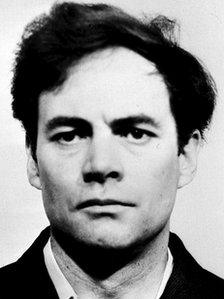Murderer Donald Neilson, the 'Black Panther', dies
- Published

The rejection of an appeal in 2008 meant Neilson was never released
Donald Neilson, the multiple murderer known as the Black Panther, has died, the Ministry of Justice has said.
The 75-year-old died on Sunday after being taken from Norwich Prison to hospital with breathing difficulties.
Neilson, from Bradford, was convicted of four murders, including that of 17-year-old Lesley Whittle, kidnapped from her Shropshire home in 1975.
Three years ago he lost an appeal to have his life sentence, imposed in 1976, reduced to 30 years.
A Prison Service spokesman said Neilson was taken to hospital in the early hours of Saturday after suffering breathing difficulties and was pronounced dead at 18:45 GMT on Sunday.
"As with all deaths in custody, the independent Prisons and Probation Ombudsman will conduct an investigation," he said.
Neilson murdered 17-year-old heiress Lesley Whittle in 1975, having shot dead three sub-postmasters during armed robberies between February and November 1974.
The earlier victims had been: Donald Skepper, shot dead in Harrogate, North Yorkshire; Derek Astin, in Higher Baxenden, Lancashire; and Sidney Grayland, in Langley, West Midlands.
'Horrific ordeal'
Also responsible for about 400 burglaries during a 10-year criminal career, the killer was dubbed "The Black Panther" as a result of witness descriptions of his dark clothing and powerful physique.
Neilson, who had been a builder, kidnapped Miss Whittle from her home in Shropshire and left a ransom demand for £50,000.
The teenager's body was later found hanging in an underground drainage system, where Neilson had secured her by the neck with wire.
In 2008, High Court judge Mr Justice Teare ruled the killer must never be released from prison, saying: "This is a case where the gravity of the applicant's offences justifies a whole life order."
The judge said the three murders of sub-postmasters "involved a substantial degree of premeditation" because Neilson took a loaded firearm with him which he was prepared to use.
Mr Justice Teare added: "The manner in which the young girl was killed demonstrates that it too involved a substantial degree of premeditation or planning. It also involved the abduction of the young girl."
The location and manner of Lesley Whittle's death "indicates that she must have been subjected by the applicant to a dreadful and horrific ordeal", he said.
- Published19 December 2011
- Published19 December 2011